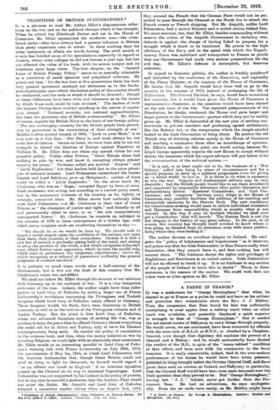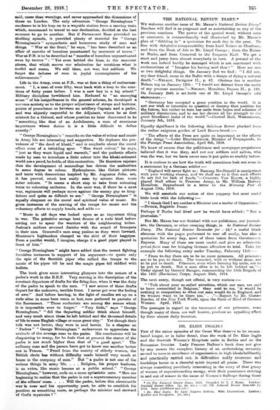A PADRE IN FRANCE.*
IT was a misfortune for "George Birmingham" that when he elected: to go to. France as a padre he. could not have as his adviser and protector that redoubtable cleric. the Rev. J. J. Meldon. True, the companion that Fate found for him was sufficiently enterprising to steal apples from a railway truck when no other lunch was available, and, generally displayed a spirit superior in strength to that of "George Birmingham." But it needed the red-haired curate of Ballynioy to carry things through properly. He would never, we are convinced, have been overawed by officials with the mere title of M.L.O. or R.T.O., or abashed by a Chaplain- General, even though that. dignitary did combine the powers of a General and a Bishop ; and he would undoubtedly have flouted the verdict of the M.O., in spite of the " maay-tabbed " condition of that officer, and been sent with his companion to the front trenches. It is easily conceivable, indeed, that in the over-zealous performance of his duties he would have been taken prisoner, pereisted in being brought before the German General Staff, and there given them such an oration on Ireland, and Ballymoy in particular, that the General Staff would, have been even more bemused over the Irish question than they proved to be. But "George Birmingham," having left "J. J." behind, never got further than the Per- manent Base. He had no adventures, he says apologetic- ally. Even the air raids were rarely, as Mr. Maiden might have * 4 Padre ia France. By George A. Birmingham. leaden: Hodder end Stoughton. [Gs. mt.] said, more than warnings, and never approached the dimensions of those on London. The only adventure "George Birmingham" confesses to is his leap on to a wayside station from a moving train which, announced to travel to one destination, decided at the last moment to go to another. But if Permanent Base provided no thrilling episode, it provided plenty of material for "George Birmingham's" sympathetic and humorous study of men and things. "War at the front," he says, "has been desoribed as an affair of months of boredom punctuated by moments of terror." War at P.B. is to be described as "months of boredom unpunctuated even by terrror " : "Yet even behind the lines, in the remotest places, that whicth moves our admiration far outehines what is sordid and mean. We still bless, not war, but soldiers. We forget the failures of man in joyful contemplation of his achievements."
Life in the Army, even at P.B., was at first a thing of embarrass- ment. "I, a man of over fifty, went back with a leap to the emo- tions of forty years before. I was a new boy in a big school." Military discipline bewildered him. Reduced to "an annoying sense" of his insignificance in the general scheme, he developed a nervous anxiety as to the proper adjustment of straps and buttons, points of precedence as between an artillery Captain and a padre, and was abjectly respectful to the Adjutant, whom he at first mistook for a Colonel, and whose position he later discovered to be "something like that of an Archdeacon, a man of enormous importance whose duties it is a little difficult to define exactly."
"George Birmingham's "remarks on the value of colour and music in Army life are interesting and suggestive. He deplores the pre- valence of "the devil of khaki," and is emphatic about the moral effect even of a twinkling spur. "Men want colour," he says, "just as they want liquid and warmth," and the pathetic efforts made by men to introduce a little colour into the khaki-coloured world are a proof, he holds, of this contention. He therefore rejoices that the development of camouflage has driven the authorities in some degree to colour. Hydroplanes, like Cubist pictures and tents with decorations inspired by Mr. Augustus John, are, it has proved, much less easily seen by airmen than more sober colours. "lb seems a short step to take from colouring tents to colouring uniforms. In the next war, if there be a next war, regiments; will perhaps move against the enemy gay as king- fishers and quite as difficult to see." "George Birmingham" is equally eloquent on the moral and spiritual value of music. He gives instances of the craving of the troops for music and the voluntary efforts to supply bands, and adds:— "Music in old days was looked upon as an important thing in war. The primitive savage beat drums of a rude kind before setting out to spear the warriors of the neighbouring tribes. Joshua's soldiers stormed Jericho with the sound of trumpets in their ears. Cromwell's men sang psalms as they went forward. Montrose's highlanders charged to the skirl of their bagpipes. Even a pacifist would, I imagine, charge if a good piper played in front of him."
"George Birmingham" might have added that the recent fighting furnishes instances in support of his argument—to quote only the epic of the Scottish piper who rallied the troops to the music of his pipes till he and the magic pipes fell riddled with bullets.
The book gives some interesting glimpses into the nature of a padre's work in the B.E.F. Very moving is the description of the constant departure of drafts for the flring-line, when it was the duty of the padre to speak to the men. "I saw scores of these drafts depart for the unknown, terrible front. I never got over the feeling of awe." And before leaving, in the light of candles set up on a rude altar in some bare room or hut, men gathered to partake of the Sacrament. "These eucharists are among the scenes which it is impossible ever to forget." "Very little," says "George Birmingham," "did the departing soldier think about himself, and very much about those he left behind and the thousand details of life in-some English village or some great city." Yet though their talk was not heroic, they were in soul heroic. In a chapter on " Padres " "George Birmingham" endeavours to appreciate the attitude of the average man to the padre. His conclusions will be disquieting to many, for he feels that at present the status of the padre is not much higher than that of "a good sport." The ordinary man and the parson have got to know one another better out in France. "Freed from the society of elderly women, the British cleric has without difficulty made himself very much at home in the company of men." But "a padre is not one of the serious things in army life. . . . Religion, his proper business, is an extra, like music lessons at a public school." "George Birmingham," however, ends on a more optimistic) note. "Men are beginning to realize that the padre is not a supernumerary member of the officers' mess. . . . Will the padre, before this abominable war Is or and this opportunity past, be able to establish his position as something more, as perhaps the minister and steward of God's mysteries ? "



























 Previous page
Previous page